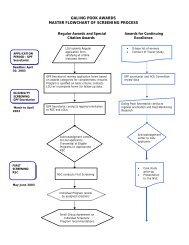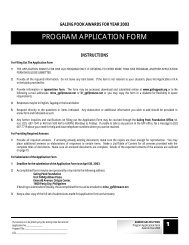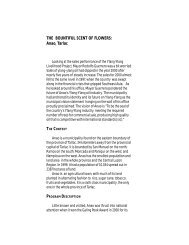kaban galing - front cover - galing pook
kaban galing - front cover - galing pook
kaban galing - front cover - galing pook
You also want an ePaper? Increase the reach of your titles
YUMPU automatically turns print PDFs into web optimized ePapers that Google loves.
A breakdown of the expected outcomes of these three strategies<br />
follow.<br />
Strategy 1: Progressive Perspective. One principle underlying this<br />
strategy is: “What the law does not expressly prohibit, it allows.” The<br />
outcome is a proactive school board that functions beyond merely<br />
additional budgeting support to DepEd. The components are: (a)<br />
participative planning and budgeting; (b) divisionwide achievement<br />
testing; (c) performance-based teacher incentives; and (d) more<br />
transparent teacher recruitment. Another principle is: “The school board<br />
budget provides the basis for activities that go beyond current laws on<br />
the local school board.” The outcomes are: (a) 2002 and 2003 budgets<br />
were crafted with strong stakeholders’ participation; (b) the Performance<br />
Incentive Fund authorized the conduct of divisionwide pre-testing and<br />
post-testing for school year 2002-2003 with results serving as bases<br />
for additional teacher incentives; and (c) budgetary provision for hiring<br />
locally funded high school teachers paved the way for teacher recruitment<br />
reforms.<br />
Strategy 2: Partnerships. One underlying principle is: “Role definition<br />
and the setting of the rules of engagement minimizes potential conflicts.”<br />
The expected outcomes are: (a) DepEd has the mandate to provide<br />
basic education; (b) City Hall is obliged to get involved in basic education<br />
because it is accountable for the Special Education Fund; and (c) as<br />
taxpayers and funders of public schools, local communities have the<br />
right to demand quality basic education. A second underlying principle<br />
is: “Resource complementation attains synergy, which means the whole<br />
is greater than the sum of its parts.” The expected outcomes from the<br />
partnership are: (a) for Partner 1-DepEd: operating funds for public<br />
schools, expertise in education; (b) for Partner 2-City Hall: augmentation<br />
funding for public schools, and expertise in governance; and (c) for<br />
Partner 3-Local Communities: additional funding for school and classbased<br />
projects and activities, and non-government organizations<br />
provide specialized services, particularly in non-formal education;<br />
and (d) for Partner 4-Other Stakeholders: additional funding and<br />
technical support.<br />
A corollary principle is specialization or moving towards one’s core<br />
competence: The expected outcomes are: (a) DepEd: partner academic<br />
institutions’ core competency is education; and (b) City Hall: core<br />
competence in governance and a key action is for City Hall to positively<br />
124 Kaban Galing












![[Year] Paano Tayo Aasenso? - Galing Pook Foundation](https://img.yumpu.com/3809385/1/184x260/year-paano-tayo-aasenso-galing-pook-foundation.jpg?quality=85)